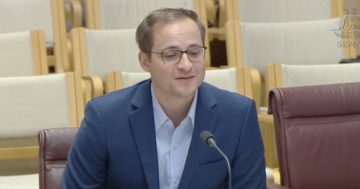
Senate report found outside staff were doing work that should be part of the public service’s core business. Photo: File.
The increased use of outsourcing and short-term, temporary staff has eroded the capability of the Australian Public Service and allowed labour-hire companies to “pillage the public purse”, a Senate committee has found.
The Second interim report: insecurity in publicly-funded jobs from the Select Committee on Job Security blamed the Coalition Government’s average level staffing cap for the over-use of temporary workers, whose hire came at a considerable mark-up to agencies.
The Community and Public Sector Union had told the committee that Government’s approach had caused the outsourcing of knowledge and policy, compromised service delivery, eliminated good jobs and harmed the communities who are reliant on them, and abandoned the role as custodian of a career public service, and the institutions and norms which Australian democracy relies upon.
My Public Sector
The committee had also heard that contractors experienced lower conditions and less career progression than permanent staff.
The report said that it was clear that outsourcing did not deliver cost savings for the Australian taxpayer.
“While the agencies have highlighted that external and casual workers are cheaper and easier to hire and fire, labour-hire companies and outsourced service providers have been allowed to pillage the public purse through excessive profit margins, meaning not only is the Australian public receiving a degraded quality of service, they are also paying more for it,” the report said.
There was evidence that labour-hire workers cost at least 20 per cent more than directly engaged staff. At the Australian Maritime Safety Authority, the mark-up was 23 per cent.
“The contention by the Australian Public Service Commission that such mark-ups deliver value for money because they make it easier to hire and fire workers as needed is the clearest indication yet that the APS is not being managed in the best interests of APS workers or taxpayers,” the report said.
The committee was also concerned about the lack of data or tracking about the cost of labour-hire in the APS.
“There is a lack of transparency around the engagement of labour-hire and other external workforce arrangements in the APS, and it is particularly concerning that a centralised record of labour-hire headcount and expenditure is not recorded by either the APSC, or the Department of Finance,” it said.
The committee recommendations included scrapping the ASL cap, taking ongoing and regular work back in house, rebuilding skills, and capping the amount spent on consultants and contractors.
It recommended that agencies only use outside staff when the work is genuinely short-term and not ongoing.
It also wants the APSC to collect and publish data on the use of contractors, consultants and labour-hire workers, Finance to collect and publish data on their cost, and for labour-hire firms to disclose pay rates and employee conditions.
Coalition members of the committee produced a dissenting report saying that hiring outside staff was crucial to managing surges in demand and delivering the necessary services to the Australian public at the standard expected.
“Surge demand being managed with temporary, flexible employees is the best outcome for efficiency of taxpayer-funded services, for those employees valuing the dynamic and flexible contracts,” they said.





















